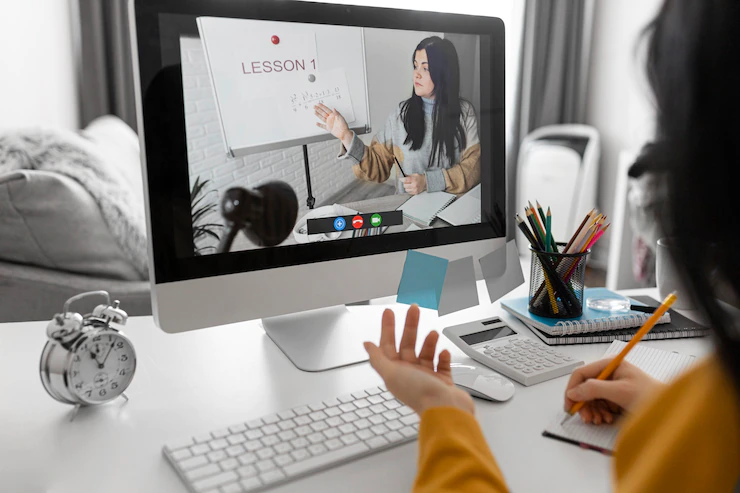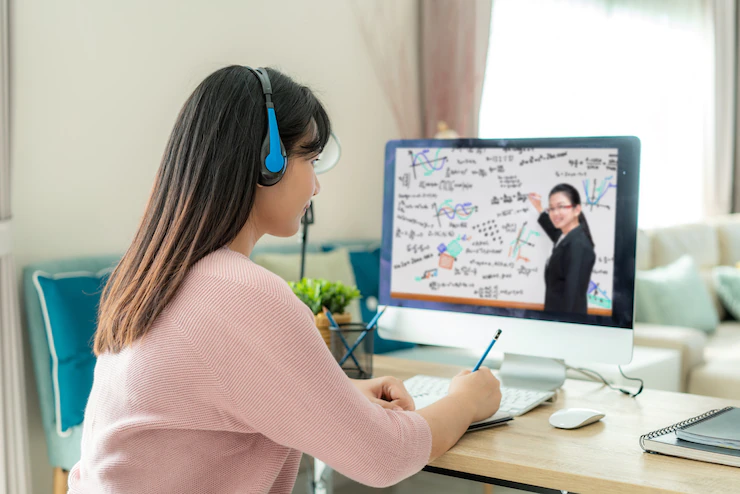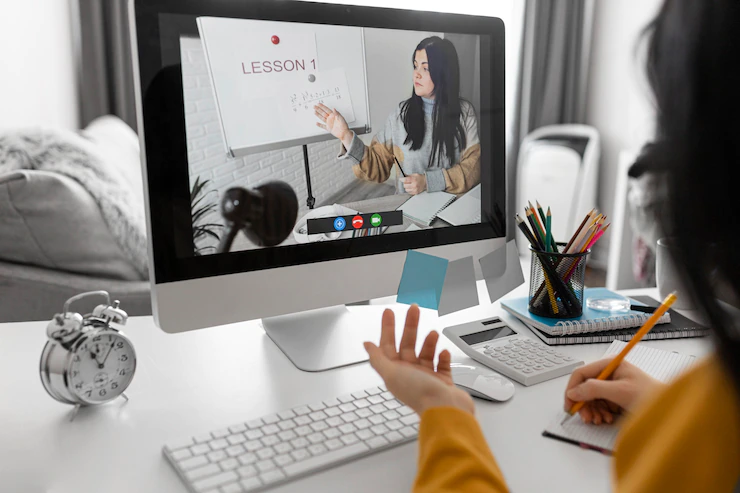The advent of the COVID-19 pandemic required big changes to the way we live our lives. From going to work to send our children to school, our daily lives changed overnight.
One of the biggest changes was the disruption of the typical learning experience for children around the world. Instead of attending on-site classes every day, billions of students found themselves instead amid a rapidly changing online learning environment.
And while this has been a process with its ups and downs, the impact of this period of transition and change on the future of learning is poised to be a positive one overall.
What do you think about online learning? This blog will look at the ways in which responding to the pandemic has improved the e-learning experience and changed the way we think about education.
Why Did The Pandemic Change Education?
Much attention has been paid to the way that COVID-19 affected the business landscape, with record numbers of employees working from home all around the world. The impact the pandemic has had upon the field of education has been a bit less discussed by many, but the long-term effects are even more pronounced.
The beginning of 2020 heralded the start of the COVID-19 pandemic for much of the world. This is perhaps especially true in the western world, with many people experiencing a seemingly sudden shift in their daily lives.

It was no longer safe to meet in person, for example, and appropriate safety measures were still uncertain in the early days of the world event. This led to partial or full lockdowns around the world, with people no longer able to attend school in person. Instead, the focus shifted to online education.
Online learning was not a new concept prior to the pandemic, but it was not a daily part of most people’s lives. That changed quickly, with children and adults alike relying on technology to keep them connected and maintain their coursework. And, because online learning was still a relatively underutilized tool in the pre-pandemic world, the shift from in-person to online instruction was jarring for many.
Today, years after the start of the pandemic, education both online and in-person has settled into a type of ‘new normal’. Let’s look at some of the ways in which this new reality is different from before.
Access To Education
Online learning is both a boon and a challenge for access to education. On one hand, the rise of technology-based learning makes it easier than ever to find the right class for almost any topic under the sun. More specifically, it is now easier than ever to find classes that fit in with your schedule.
Do you prefer to study at night? There is likely a class for you. Perhaps early morning courses better fit with your busy workload? That is probably an option too. Technology-based learning makes it easy to learn on the go as long as you have access to a compatible device.

The caveat, of course, is that you must have access to a compatible device to participate in online learning. And while many people have something that will work, be it a smartphone, an old tablet, or a computer, not everyone does.
This has led to the way we view education shifting in an unexpected way. Instead of looking at notebooks and pens as back-to-school essentials, many schools are instead looking at ways to make online
Versatile Learning Experiences
There is no ‘one size fits all’ teaching style that works for everyone. Some people do better with visual learning methods, for example, while others prefer to read from a book and take plenty of notes to study outside of class.
Just as with access to education, internet learning can be a bit of a mixed bag when it comes to personalized learning, however, it can be more productive when technology is wielded smartly.

Instead of sticking to one type of multimedia when conducting an online learning-based lesson, instructors who make it a point to include different types of engagement opportunities in their classes create diverse learning opportunities for their students.
Short lectures paired with group discussions, videos, and pop-up quizzes, for example, can appeal to a variety of learners without overwhelming any of them. Online learning can make this kind of blend easier than ever, allowing teachers to really reach students of different learning levels.
Enhanced Remote Learning
The rise of internet-based learning during the height of the pandemic has also made it easier to create ‘enhancements’ to more traditional in-person learning. Instead of requiring students to take handwritten notes or do their own outside research if they want more information about the topic in question, the increased use of online learning makes it easier to share a wealth of resources with students.
From additional text to videos and other media files, students can now easily access more factually accurate resources than ever before with the click of a button. Teachers can use this connectivity to curate a collection of assets designed to reinforce in-person lessons.

In fact, online learning can truly revolutionize education for good. Technology can support classroom learning even outside of the classroom, be it digital or physical. As online learning became the norm in 2020, students and teachers alike were forced to redefine what ‘engagement’ means in the pandemic era.
This resulted in an explosion of creativity, with students not only finding new ways to express themselves but also excelling at creative exam structures.
Technology serves not solely to disrupt ‘normal’ education, in other words, but rather as an addition to a modern learning experience that places more emphasis on students rather than teachers.
The Rise Of Hybrid Education
As the pandemic raged across the globe, in-person interaction of any kind became hotly debated. This led to the all-online learning approach.
There was no choice but to interact solely digitally for many people, in other words, which did not afford students and teachers much flexibility to craft classrooms that work for everyone – both the in-person learners and those who appreciate online options.
Today, as the pandemic slowly grows more manageable and vaccines are available which makes in-person interaction safer, the same urgency is not present.

Teachers are more able to experiment with their online and in-person classes to create a hybrid approach that combines the benefits of technology-enhanced education with the advantages of fostering direct communication and collaboration among students both online and off.
The future is bound to strike a balance between online learning and traditional classroom structure which makes it easy to utilize the internet and technology’s potential without forcing everyone to take part in virtual-only lessons, which are less-than-ideal for many people.
Perhaps more interestingly, however, is that hybrid education which features AI and data technology presents the opportunity to monitor students’ learning trends and outcomes in real-time, making it easier to identify potential problem areas along with learning strengths and weaknesses.
This information can then be used, sometimes to create tailored learning experiences, sometimes autonomously using software, so that students have the best chance possible to thrive.
While not all the above has been fully realized and implemented, the COVID-19 pandemic took education to a place where online learning and the benefits it presents can be included in an everyday learning environment. This change is a permanent one, and although the extent to which it alters student life moving forward will be determined by individual school systems, education is poised to benefit greatly from the shift to technology-enhanced learning.
Tips To Get The Most Out Of Online Learning
Online learning is here to stay, but that does not mean that it is an easy process for everyone. In fact, even students who otherwise enjoy learning can find it difficult to focus in online classes. Without effective engagement strategies to maintain interest, it is easy to fall behind.

Let’s look at some tips to make online classes a successful experience!
1. Recognize your online course as a ‘real’ class
Some students view online learning as a break from ‘real’ learning – their in-person work. This is a mistake, however, as taking such a dim view of the class in question can result in students who are focused more on getting through an inconvenient appointment than sitting down and learning from their instructor.
Online classes require having enough self-discipline to schedule time out of every day to sit down and pay attention to the class. Whether the course is focused on real-time learning or features recorded lessons students can work through on their own time, it is critical to view online learning as having the same importance as more traditional classes.
One way to take online courses more seriously is to treat the class just like you would an in-person course. Create a schedule for yourself, get up on time, get dressed, and make a big deal out of settling down in front of your computer.
When you are dressed for success and create the mental expectation of something out of the ordinary happening (rather than just lounging on your bed, listening to the lesson while flipping through Facebook), you are setting yourself up for success.
2. Create a study space
This goes hand-in-hand with the point above. In addition to setting a specific time each day to sit down for your course, create a study space to utilize. This should be an area separate from your bed or couch which you set up as you would a classroom.
Collect your school supplies, stock the space with healthy snacks, and consider taking your backpack with you when you head to the space to get started. Whether this is a place on the floor of your living room or a private home office room, create a study space that is consistent. While you can change venues if you find one area too distracting, of course, part of the effectiveness of this tip is the structure it provides.
While it might be tempting to wake up late and haphazardly roll over and start your course while still in bed, doing this is setting yourself up to fail.
3. Be active
Whether your class has real-time discussions or instead features community forums where you interact with your fellow students, take an active part in the conversation! Interact with other students as well as your instructor, as needed and possible, to associate the class with people rather than a computer screen. This makes it easier for some students to focus during the class itself.
What The Pandemic Did Not Change
The role of teachers in education is more important than ever. This might seem somewhat counterintuitive – after all, if technology is doing the ‘heavy lifting, are teachers truly that critical to the process? The answer, of course, is a resounding yes.
As technology plays an increased role in online learning, instructors who understand not only their area of expertise but also the technology in question are vital to an experience conducive to learning.
With that in mind, choosing quality institutions with instructors well-versed with e-learning is critical to success.
This is true not only for students in grade school but also for those who are looking into higher education. It is perhaps especially important with higher education, in fact, as the courses can be quite detailed and complex as you progress towards your degree.
Note that even courses that have traditionally required primarily in-person education can be accessed online through accredited universities. Picking an online nursing program, for example, is an increasingly easy decision to make.
Elmhurst University is a trusted leader in the industry with all the resources necessary to craft a truly incredible online learning experience, especially for those seeking a brand new challenge as their aforementioned nursing course is tailor-made for those yet to study it before.
What do you think about online learning? COVID-19 has made the process more common than ever before, and while there are still challenges to work through, the impact this will have on education in the future could prove to be incredibly beneficial.
Additionals:






















